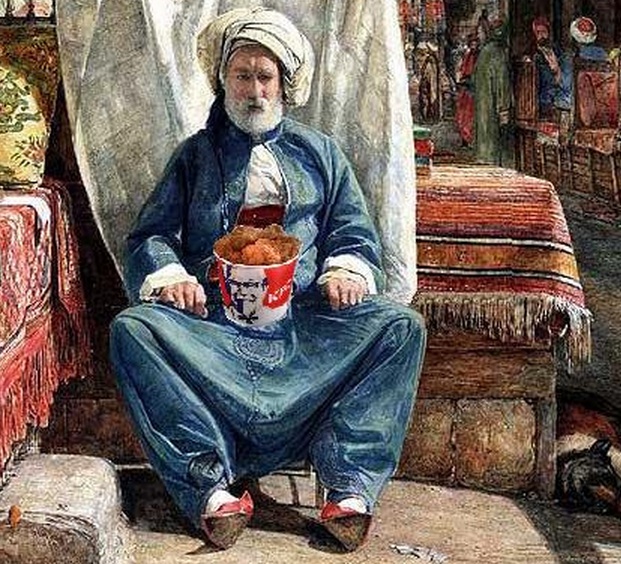A business man in the Gaza Strip has found a lucrative way of satisfying the urge for KFC by smuggling it through underground tunnels. It may be four hours cold, with a side of soggy chips, but for Gazans it is a taste of freedom. Oprah might like to hear this news.
Green Prophet learns about the smuggling operation through a report in the New York Times. While we like to celebrate positive eco movements that are coming to light under the difficult political situation there in Gaza –– slow food, growing food on rooftop gardens, reliance on home cooked meals (see this new Gazan cookbook) –– we also like to support food freedom and food choices, even if it means greasy, cold take-away.
When I was pregnant with my first child a couple of years ago I had a strange craving for Big Macs – without cheese. It was something to do with the secret sauce and the way it combined with the pickles and rehydrated onions that satisfied my urge. There was one week where I ate three of them to satisfy this shameful craving.
But urges in pregnant women should not be ignored. So I gave into it. Urges could be a sign of some important mineral or vitamin missing in one’s diet. I’ve even heard of strictly observant pregnant Jewish women being pardoned to eat non-kosher food combinations if her desire to eat this food is over-powering.
Over in the Gaza Strip most women (pregnant or not) have probably never tried a Big Mac (lucky for them probably) because you won’t find Western fast food chains setting up shop in a very unstable political environment.
A young entrepreneur Khalil Efrangi, 31, found a way around the blockade. According to the New York Times:
Formerly called Kentucky Fried Chicken, a KFC franchise opened in El Arish, just over Gaza’s southern border, in 2011, and in the West Bank city of Ramallah last year. That, along with ubiquitous television advertisements for KFC and other fast-food favorites, has given Gazans a hankering for Colonel Sanders’s secret recipe.
So after Mr. Efrangi brought some KFC back from El Arish for friends last month, he was flooded with requests. A new business was born.
“I accepted this challenge to prove that Gazans can be resilient despite the restrictions,” Mr. Efrangi said.
In the past few weeks, Mr. Efrangi has coordinated four deliveries totaling about 100 meals, making about $6 per meal in profit. He promotes the service on Yamama’s Facebook page, and whenever there is a critical mass of orders — usually 30 — he starts a complicated process of telephone calls, wire transfers and coordination with the Hamas government to get the chicken from there to here.
Religious Islamist governments don’t always see eye to eye with America and the ideals of the West. Fifteen years ago when I was in Syria, those same fast-food shops you could find in neighboring Turkey, Lebanon, Israel or Jordan were non-existant in Syria. Though Syrians craving a burger could get their fill eating a local variety, usually with odd names that vaguely sounded like the famous chains.
The flip side? Pirated versions of burgers and chicken we bet are less likely to contain industrial food additives like pink slime, meat glue, horse meat, or arsenic, which may be in KFC chicken.
Politics, ideology and healthy food choices aside, there are no Kentucky Fried Chicken chains in Gaza. But smugglers have found a way to bring it through the illegal underground tunnels that link Gaza to a black economy in Egypt.
Most officials in Egypt turn a blind eye to the tunnels run by the Hamas Government. The tunnels offer an alternative to the Gazan blockade. Israel only allows certain necessary items through the land-based border crossing. While live animals, even lions and other zoo animals, complete cars in pieces, and sewage floods are making it through the tunnels, for about $27 Gazans can now get a taste of the west, and the Colonol’s secret blend of herbs.
Image via notionscapitol

